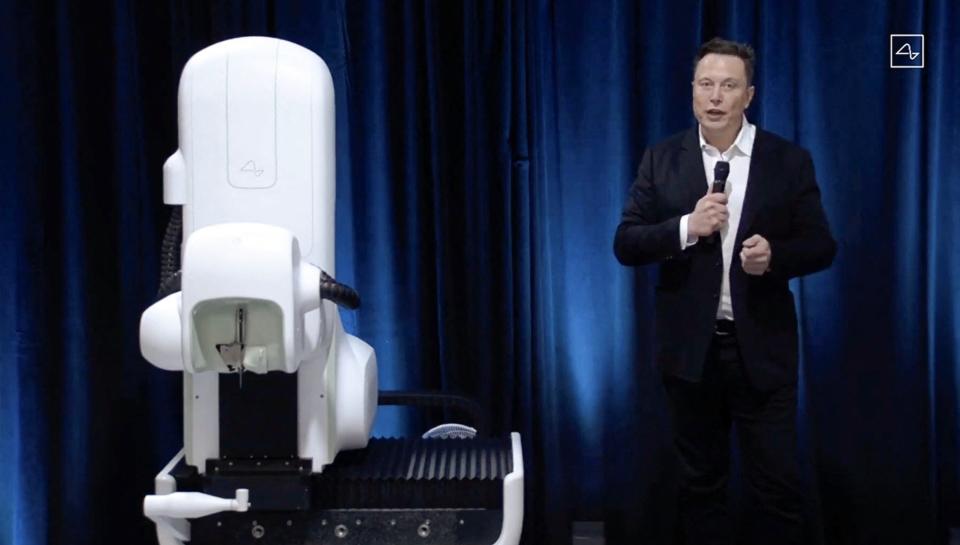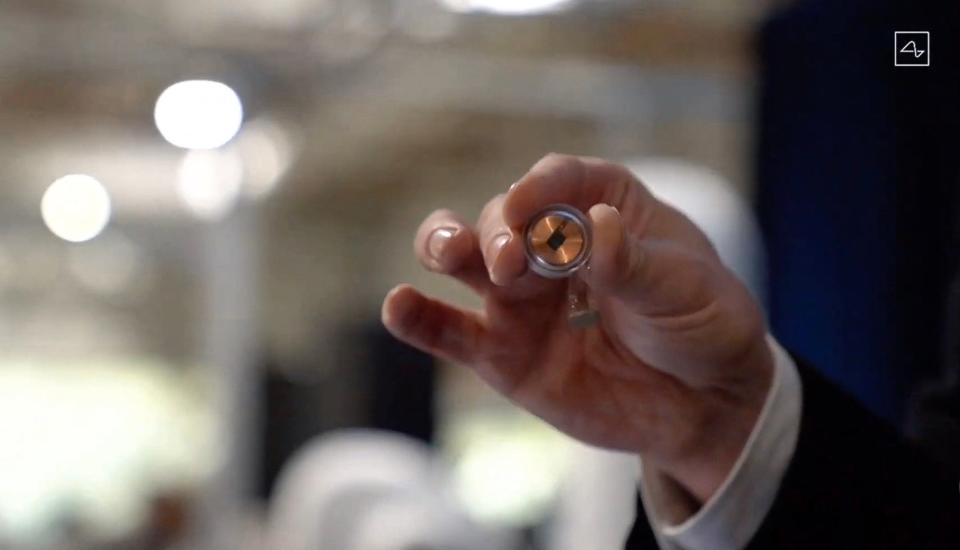Elon Musk's Neuralink, which has Austin offices, just put its first brain chip in a human
Elon Musk’s brain chip startup Neuralink has implanted its first device in a human, the billionaire announced Monday evening in a social media post.
In a series of posts on X, formerly Twitter, Musk said the first human had received a Neuralink brain chip implant on Sunday and is “recovering well." Musk said the initial results and data are “promising."
Neuralink, which is headquartered in Fremont Calif., and has at least two offices in Central Texas, has been working to develop a computer-brain interface that would let people control a computer or mobile device using their minds.
Musk said on social media that the company’s first product, called “Telepathy,” will be a part of a clinical trial for six years. According to Neuralink’s website, some individuals who have paralysis in all four limbs due to a spinal cord injury or amyotrophic lateral sclerosis, or ALS, qualify for the trial.

Musk said the device would let people who have lost the ability to use their limbs control their phone, computer or other devices by thinking.
“Imagine if Stephen Hawking could communicate faster than a speed typist or auctioneer,” Musk said on X. “That is the goal.”
Neuralink has been testing its technology on animals with Bluetooth-enabled brain chip implants that allow them to communicate with computers through a receiver. The company’s best-known demonstration of its technology came in 2021, when it shared a video that claimed a monkey using Neuralink's technology was playing Pong with its mind by moving the cursor on screen without a joystick.
The company’s goal to start human trials has been pushed back several times since 2019, when Musk said the company aimed to start human trials in 2020.
The neurotechnology company officially received clearance from the Food and Drug Administration to start human clinical trials in May. But the company has faced regulatory hurdles related to safety concerns in recent years, including the FDA rejecting its application for human trials in March 2023 and an investigation from the U.S. Department of Agriculture over animal welfare allegations.
Elon Musk's brain tech firm Neuralink approved for human trials, Austin's Paradromics close behind
What are brain computer interfaces?
Brain-computer interface devices are designed to help people with disabilities, such as paralysis, communicate. These types of devices have yet to make it to market, or be used long-term, but industry experts see the devices as having the potential eventually to treat a range of conditions, including mental health disorders, or to help people with spinal injuries walk again.
Neuralink is among a handful of promising startups in the emerging industry vying to make such products commercially available. Competitors Blackrock Neurotech and Synchron have already tested the technology on humans. In Austin, Paradromics is also testing similar technology on animals and is angling towards clinical trials.

Neuralink’s technology is considered more invasive than its competitors'. The company uses technology based on flexible threads that enable it to take in more data, but that can make the device more fragile. Musk has described the device as a Fitbit for your skull, with small wires that go into your brain.
While Neuralink’s initial technology is expected to be used to treat certain conditions, Musk also sees the technology as eventually being used in the general population, including himself. Musk has said the company hopes people will one day be able to upgrade the chips as new versions come out.
How does Austin fit in?
Neuralink has been building a significant Austin presence in recent years, but, like many of Musk's companies, the company moved into the region with little announcement, making it unclear when Neuralink expanded into Central Texas or what exactly it is up to in the region.
During an event in 2022, a Neuralink employee said Austin has become the center of device manufacturing for Neuralink, has a double operating room and planned to build a clinic. Job postings for Austin have also included a range of positions, including those related to brain interfaces, software, engineering, research, surgery, robotics and operations. But the postings have largely mentioned animals, making it unlikely human trials are currently being conducted in Austin.
Plans filed with Travis County and acquired by the American-Statesman show the company has been building a campus on Caldwell Lane off Texas 71 near the Colorado River on a 37-acre property not far from its Tesla factory. The plans call for eight buildings, including office space, laboratories and operating rooms.
Elon Musk's Neuralink has plans for lab, office facility in Travis County
Last year, Walter Issacson’s biography on Musk mentioned the existence of a second Neuralink office in a strip mall in Austin, in a building that previously housed an axe-throwing venue and bowling alley called Hatchet Alley. Issacson said the office has lab space, workshops and a glass-enclosed conference room. Based on the description the office is likely near U.S. 183 and Montopolis Drive, not far from some of Musk's other offices in Central Texas.
This article originally appeared on Austin American-Statesman: Elon Musk's Neuralink implanted its first brain chip in a human
